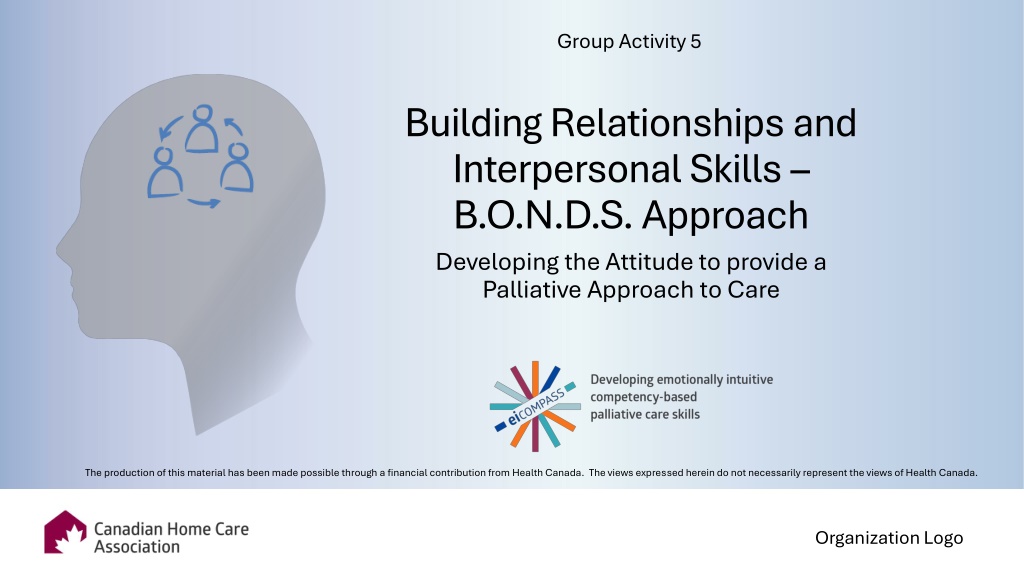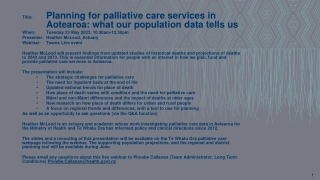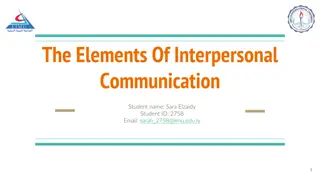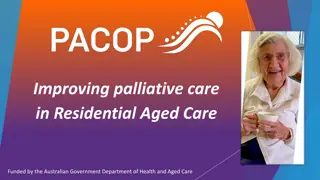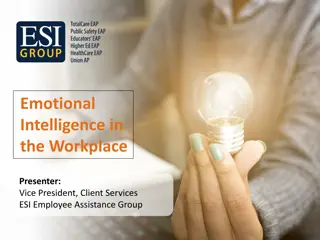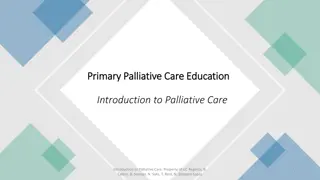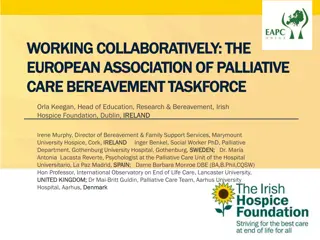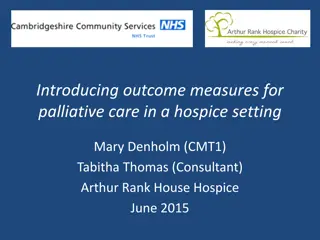Developing Emotional Intelligence and Interpersonal Skills in Palliative Care
Enhance emotional intelligence skills in healthcare for improved collaboration and patient outcomes. Focus on building interpersonal relationships through the B.O.N.D.S approach, valuing voices of patients and family members, and fostering effective communication. By practicing empathy, active listening, and diplomacy, healthcare providers can create a supportive environment in palliative care settings.
Download Presentation

Please find below an Image/Link to download the presentation.
The content on the website is provided AS IS for your information and personal use only. It may not be sold, licensed, or shared on other websites without obtaining consent from the author. Download presentation by click this link. If you encounter any issues during the download, it is possible that the publisher has removed the file from their server.
E N D
Presentation Transcript
Group Activity 5 Building Relationships and Interpersonal Skills B.O.N.D.S. Approach Developing the Attitude to provide a Palliative Approach to Care The production of this material has been made possible through a financial contribution from Health Canada. The views expressed herein do not necessarily represent the views of Health Canada. Organization Logo
Group Activity 5 Emotional Intelligence (EI) and Palliative Care Emotional intelligence is the ability to understand, manage and use your own and other people s emotions to recognize and react in helpful ways to make a positive difference.[D. Goleman, 1995] Research shows that higher levels of emotional intelligence in healthcare providers are associated with improved collaboration among healthcare professionals, better patient outcomes, and higher levels of patient and family satisfaction with the care received. Through consistent practice and commitment, you can enhance your emotional intelligence skills. This involves becoming better at: Accurately identifying and expressing your emotions. Deepening your understanding of how emotions impact your thoughts and behaviours. Skilfully managing and regulating your emotions. Harnessing emotions to guide your thoughts and actions. Organization Logo
Group Activity 5 The importance of Interpersonal relationship skills Interpersonal Relationship Skill Importance Patient Comfort Family Support Understanding needs Providing information Empathy Psychosocial Care Managing Differences Handling Stress Coordinated Care Resource Utilization Respecting Diversity Personalized Care Feedback Adaptation Building Trust and Rapport Communication Emotional Support Conflict Resolution Building trust with patients in palliative care significantly improves symptom management and patient satisfaction by over 80%. Collaboration and Teamwork Cultural Sensitivity Continuous Improvement Organization Logo
Group Activity 5 Building interpersonal relationships by practicing B.O.N.D.S Be Present : Actively listen by giving your full attention. Openness: Show empathy by imagining yourself in someone else s shoes. Nuture Connections: Form genuine relationships. Patients with a strong rapport with their healthcare providers are more likely to communicate their pain levels accurately, leading to more effective pain management. Diplomacy: Handle disagreements with tact and sensitivity. Strengthen Communication: Actively listen by giving your full attention. Organization Logo
Group Activity 5 Valuing Voices to Develop Interpersonal Relationship Skills Involving family members in care decisions can improve patient outcomes . When family voices are valued, patients often experience a 15% improvement in emotional well-being. Care Team Members Voices Engage in collaborative practice by understanding and valuing the expertise Caregivers outside the family often play crucial roles in someone s care. Their Perspectives from volunteers, non-traditional care providers and community Family Members Voices Tune into what family members know, feel and contribute. Their insights are essential in shaping and executing care plans. perspectives and experience offer a wealth of insight. groups enrich a patient s experience and care journey. Patient s Voice Listen intently to the patient s concerns, preferences and stories. Incorporate these into your care plans to align with their needs and wishes. each team member brings. Infuse this knowledge into your care strategy and actions. Caregivers Voices Community Supports Voices Organization Logo
Group Activity 5 Ways to Improve Your Ability to Value Voices Sharpen your active listening skills. Tackle your biases: Everyone has biases. Shift your viewpoint. Healthcare providers who develop meaningful connections with patients and colleagues report a 30% increase in job satisfaction. Encourage feedback. Champion inclusivity. Organization Logo
Exercise Sharpening Your Listening Skills Group Activity 5 Never = 4 Rarely = 3 Sometimes = 2 Often = 1 Your Score 1) I check my phone or computer screen during conversations 2) When people make confusing comments, I feel annoyed. 3) I get easily distracted during conversations. 4) Making eye contact with people who talk to me can be uncomfortable for me. 5) I communicate more through text messages/emails than face to face. 6) While others talk, I m thinking of what I want to say next. 7) I say what I think without filtering my comments. 8) I unintentionally offend others. 9) I think a person s body language is unimportant to what they are feeling. 10) People complain that I don t understand them. 11) I get into arguments with others. TOTAL Organization Logo
Group Activity 8 Research has shown that doctors, nurses, and other healthcare professionals with high levels of emotional intelligence tend to have better patient outcomes. This is because EI enables health care providers to better understand and empathize with patients and their families, leading to improved trust, more accurate diagnoses, and adherence to treatment plans. Patients may not always remember the exact medical advice given, but they'll remember how their healthcare provider made them feel, influencing their overall satisfaction and engagement in their care. The production of this material has been made possible through a financial contribution from Health Canada. The views expressed herein do not necessarily represent the views of Health Canada. Organization Logo
